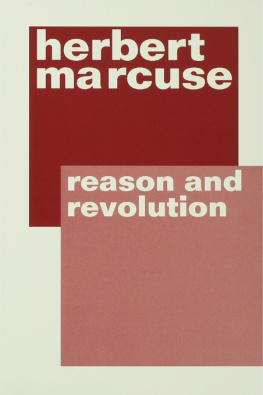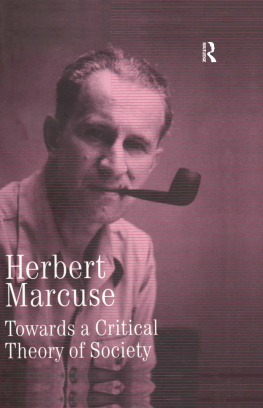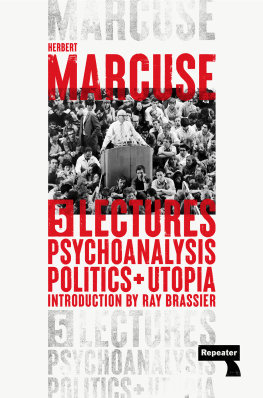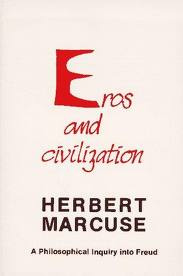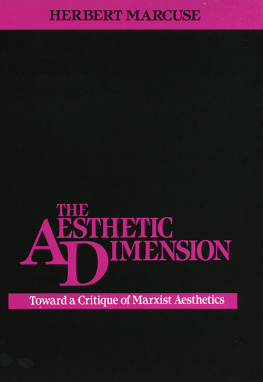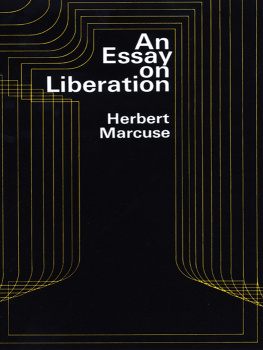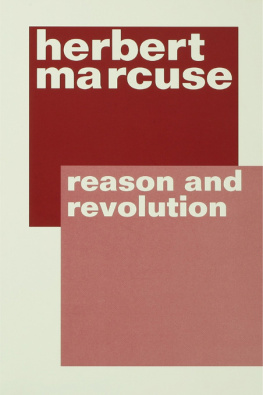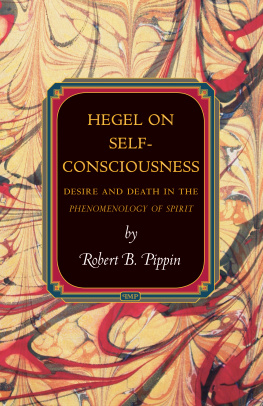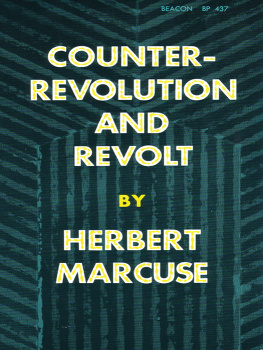
REASON AND REVOLUTION
Also Published by Routledge:
One-Dimensional Man
Eros and Civilization
The Collected Papers of Herbert Marcuse, edited by Douglas Kellner
Volume One, Technology, War and Fascism
Volume Two, Towards a Critical Theory of Society
Volume Three, The New Left and the 1960s
Volume Four, Art and Liberation
Volume Five, Philosophy, Psychoanalysis and Emancipation
Volume Six, Marxism, Revolution and Utopia
REASON AND REVOLUTION
Hegel and the Rise of Social Theory
Herbert Marcuse
2nd Edition
with Supplementary Chapter
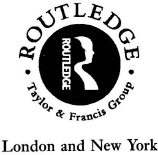
First published 2000
by Routledge
11 New Fetter Lane, London EC4P 4EE
Simultaneously published in the USA and Canada
by Routledge
29 West 35th Street, New York, NY 10001
Routledge is an imprint of the Taylor. & Francis Group
2000 Herbert Marcuse
Printed and bound in Great Britain by
T. J. International Ltd.
All rights reserved. No part of this book may be reprinted or reproduced or utilised in any form or by any electronic, mechanical, or other means, now known or hereafter invented, including photocopying and recording, or in any information storage or retrieval system, without permission in writing from the publishers.
British Library Cataloguing in Publication Data
A catalogue record for this book is available from the British Library
Library of Congress Cataloging in Publication Data
ISBN 0415214505
TO
MAX HORKHEIMER
AND THE
INSTITUTE OF SOCIAL RESEARCH
Preface

T HE content of a truly philosophical work does not remain unchanged with time. If its concepts have an essential bearing upon the aims and interests of men, a fundamental change in the historical situation will make them see its teachings in a new light. In our time, the rise of Fascism calls for a reinterpretation of Hegels philosophy. We hope that the analysis offered here will demonstrate that Hegels basic concepts are hostile to the tendencies that have led into Fascist theory and practice.
We have devoted the first part of the book to a survey of the structure of Hegels system. At the same time, we have tried to go beyond mere restatement and to elucidate those implications of Hegels ideas that identify them closely with the later developments in European thought, particularly with the Marxian theory.
Hegels critical and rational standards, and especially his dialectics, had to come into conflict with the prevailing social reality. For this reason, his system could well be called a negative philosophy, the name given to it by its contemporary opponents. To counteract its destructive tendencies, there arose, in the decade following Hegels death, a positive philosophy which undertook to subordinate reason to the authority of established fact. The struggle that developed between the negative and positive philosophy offers, as we have attempted to show in the second part of this book, many clues for understanding the rise of modern social theory in Europe.
There is in Hegel a keen insight into the locale of progressive ideas and movements. He attributed to the American rational spirit a decisive role in the struggle for an adequate order of life, and spoke of the victory of some future and intensely vital rationality of the American nation Knowing far better than his critics the forces that threatened freedom and reason, and recognizing these forces to have been bound up with the social system Europe had acquired, he once looked beyond that continent to this as the only land of the future.
In the use of texts, I have frequently taken the liberty of citing an English translation and changing the translators rendering where I thought it necessary, without stipulating that the change was made. Hegelian terms are often rendered by different English equivalents, and I have attempted to avoid confusion on this score by giving the German word in parenthesis where a technical term was involved.
The presentation of this study would not have been possible without the assistance I received from Mr. Edward M. David who gave the book the stylistic form it now has. I have drawn upon his knowledge of the American and British philosophic tradition to guide me in selecting those points that could and that could not be taken for granted in offering Hegels doctrine to an American and English public.
I thank the Macmillan Company, New York, for granting me permission to use and quote their translations of Hegels works, and I thank the following publishers for authorizing me to quote their publications: International Publishers, Longmans, Green and Co., Charles H. Kerr and Co., The Macmillan Co., The Viking Press, The Weekly Foreign Letter (Lawrence Dennis).
My friend Franz L. Neumann, who was gathering material for his forthcoming book on National Socialism, has given me constant advice, especially on the political philosophy.
Professor George H. Sabine was kind enough to read the chapter on Hegels Philosophy of Right and to offer valuable suggestions.
I am particularly grateful to the Oxford University Press, New York, which encouraged me to write this book and undertook to publish it at this time.
H ERBERT M ARCUSE
Institute of Social Research
Columbia University
New York, N. Y.
March 1941.
Contents

PART I
The Foundations of Hegals Philosophy
Introduction

1. T HE S OCIO- H ISTORICAL S ETTING
G ERMAN idealism has been called the theory of the French Revolution. This does not imply that Kant, Fichte, Schelling, and Hegel furnished a theoretical interpretation of the French Revolution, but that they wrote their philosophy largely as a response to the challenge from France to reorganize the state and society on a rational basis, so that social and political institutions might accord with the freedom and interest of the individual. Despite their bitter criticism of the Terror, the German idealists unanimously welcomed the revolution, calling it the dawn of a new era, and they all linked their basic philosophical principles to the ideals that it advanced.
The ideas of the French Revolution thus appear in the very core of the idealistic systems, and, to a great extent, determine their conceptual structure. As the German idealists saw it, the French Revolution not only abolished feudal absolutism, replacing it with the economic and political system of the middle class, but it completed what the German Reformation had begun, emancipating the individual as a self-reliant master of his life. Mans position in the world, the mode of his labor and enjoyment, was no longer to depend on some external authority, but on his own free rational activity. Man had passed the long period of immaturity during which he had been victimized by overwhelming natural and social forces, and had become the autonomous subject of his own development. From now on, the struggle with nature and with social organization was to be guided by his own progress in knowledge. The world was to be an order of reason.
Next page
